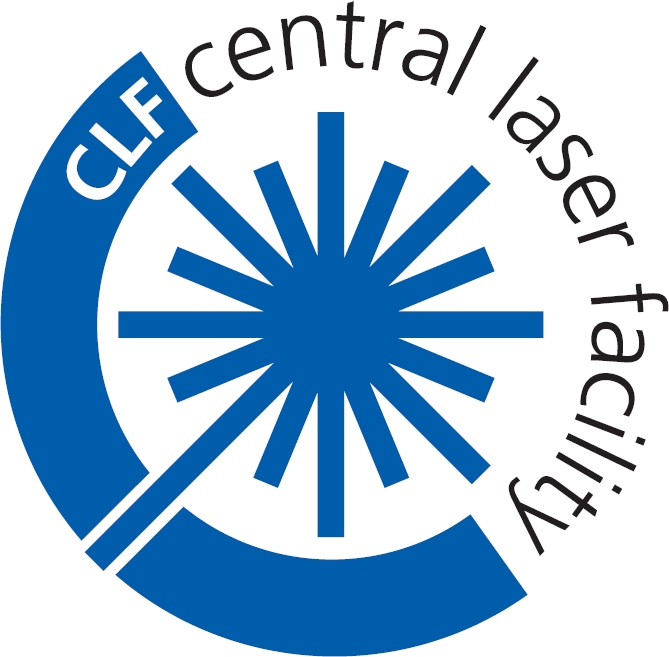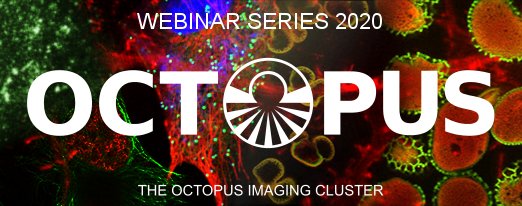

Welcome to the OCTOPUS Webinar Series 2020
Our aim is to host a free weekly webinar lasting approximately 25 minutes (including an opportunity for Q&A), featuring both our staff link scientists and researchers, as well as scientific talks from our wider user community. The topics will focus mostly on developments in and applications of fluorescence microscopy and Correlative Light and Electron Microscopy (CLEM).
Webinars will be hosted on the Zoom platform using the links given below. If you would like to submit an abstract for consideration, please contact
Prof. Stan Botchway.
Upcoming talks:
Date: TBC
Speaker: TBC
Previous talks:Date: 21st July 2020 14:30 (BST)
Title: Resolution limit of image analysis algorithms
Abstract: The resolution of an imaging system is a key property that, despite many advances in optical imaging methods, remains difficult to define and apply. Rayleigh’s and Abbe’s resolution criteria were developed for observations with the human eye. However, modern imaging data is typically acquired on highly sensitive cameras and often requires complex image processing algorithms to analyze. Up until now, there have been no approaches for evaluating the resolving capability of such image processing algorithms that are now central to the analysis of imaging data, particularly location-based imaging data. Using methods of spatial statistics, we develop a novel algorithmic resolution limit to characterise the resolving capabilities of location-based image processing algorithms. We provide a method for estimating the algorithmic resolution limit and quantify the effect of insufficient algorithmic resolution on location based image analysis.
Date: 14th July 2020 14:30 (BST)
Title: Understanding and exploiting self-assembly in liquid crystals
Date: 30th June 2020 14:30 (BST)
Title: Nano-Formulation Engineering: Investigating Molecules at Interface for the Design of Sustainable Chemical Products
Date: 23rd June 2020 14:30 (BST)
Title: Super resolution imaging of nuclear organisation during transcription and DNA repair
Date: 9th June 2020 14:30 (BST)
Title: How to tell left from right
Abstract: The human body is externally mirror symmetrical between left and right, but as any small child will tell you, the heart is positioned towards the left side of the body. Indeed, most of the internal organs and associated vasculature show left-right asymmetry in their pattern and positioning. This asymmetry is established early during embryonic development, when polarised cilia beat to cause a leftward flow of fluid in a structure we call the node. This bio-mechanical force/flow is somehow interpreted by cells at the edge of the node. We use a combination of genetics, cell biology and developmental biology to address how this process works and to assess its role in disease. I will introduce the biology and then discuss how we and others use imaging to visualise aspects of the process; I will try to highlight some of the challenges we currently face and what we are currently unable to image.
Website: https://www.har.mrc.ac.uk/research/cilia-development-and-disease/
Date: 2nd June 2020 14:30 (BST)
Title: Bacterial DNA repair mechanisms revealed using single molecule imaging and force methods
Title: smFRET to probe the dynamics of the antibacterial peptide ABC transporter McjD
Date: 12th May 2020 14:30 (BST)
Speaker: Dr. Michael Hirsch (STFC)
Title: Sampling of single particle tracking solutions for single molecule microscopy
Abstract: The dependence on model-fitting to evaluate particle trajectories makes it difficult for single particle tracking (SPT) to resolve the heterogeneous molecular motions typical of cells. We present here a global spatiotemporal sampler for SPT solutions using a Metropolis-Hastings algorithm. The sampler does not find just the most likely solution but also assesses its likelihood and presents alternative solutions. This enables the estimation of the tracking error. Furthermore the algorithm samples the parameters that govern the tracking process and therefore does not require any tweaking by the user. We demonstrate the algorithm on synthetic and single molecule data sets. Metrics for the comparison of SPT are generalised to be applied to a SPT sampler. We illustrate using the example of the diffusion coefficient how the distribution of the tracking solutions can be propagated into a distribution of derived quantities. We also discuss the major challenges that are posed by the realisation of a SPT sampler.
Date: 28th April 2020 14:30 (BST)
Title: Generating synthetic bacterial vesicles to enhance recombinant protein production for Industrial Biotechnology applications
Abstract: The isolation of recombinant biopharmaceuticals from large scale fermentation cultures is a major challenge to industry. The ability to target the secretion of recombinant proteins into culture media is attractive as it improves efficiency and reduces costs. Currently there are no established methods for transporting recombinant proteins across bacterial membranes, or for generating vesicles to facilitate the subsequent isolation and purification of a biopharmaceutical protein from the culture media. We have developed a novel system that utilises the expression of a synaptic vesicle turnover regulating protein, that when expressed in the established recombinant protein production gram-negative bacterium, E. coli, drives the formation of extracellular vesicles, or exosomes. We have also established preliminary methodologies for targeting desired proteins of interest to the interior of the recombinant vesicle. These combined synthetic systems provide an exciting opportunity for delivering high-value recombinant proteins from the bacterial cell, into the culture media, to allow simple protein purification from continuous and perfusion cultures. During this talk I will describe how live cell imaging, molecular biology and biochemical metholodogies have been used to characterise and direct the development of this novel recombinant production system.
Date: 21st April 2020 14:30 (BST)Speaker: Dr. Lin Wang (STFC)
Title: Super-resolution microscopy: concepts and bioimaging applications
Abstract: Super-resolution microscopy (SRM) has revolutionised the way we understand biology. In this talk I will give a brief introduction to the physics and mathematics behind a variety of SRM, including Airyscan, Structured Illumination Microscopy (SIM) and Single Molecule Localisation Microscopy (SMLM). I will also present a few case studies demonstrating how we use SRM to decipher the relationships between some proteins’ spatial organisation and their function in changing cellular context. From this talk, potential users may comprehend the characteristics of different SRM imaging modalities, therefore choose the most suitable imaging methods in their own research.
Date: 7th April 2020 14:30 (BST)
Title: Photoaffinity (cleavable) kinase probes for chemical proteomics and binding site mapping
Abstract: Chemical proteomics is powerful strategy that uses chemical probes for a functional read-out of the proteome (depending on the type of probe used), directly in native biological systems. In the kinase drug discovery field, this read-out is related to the proteome-wide selectivity of kinase inhibitors. In this talk, I will first give an introduction about chemical probes and chemical proteomics and then give two examples of my current research. The latter involves profiling the off-targets of kinase inhibitors as well as a novel MS-based method for mapping their binding site.
Date: 31st March 2020 14:30 (BST)Speaker: Dr. Alessia Candeo (STFC)
Title: Real time imaging of the flow of a bio-ink in a 3D bio-printing setup
Abstract: Three-dimensional bio-printing is opening up new frontiers in tissue engineering and regenerative medicine. In extrusion bio-printing the bio-ink that contains living cells and the parameter used for printing it are crucial for the bioproduct survival. Hence, the study of the bio-ink flow behaviour is fundamental to optimise the printing process and results. In this study, we present an imaging method based on light sheet fluorescence microscopy to visualise in real time the flow of bio-inks through a capillary at varying velocities and material concentrations. The experimental setup and the anlaysis routine will be presented, as well as some considerations on gelatin methacryloyl, a type of bio-ink, more and more used in the bio-printing community.
